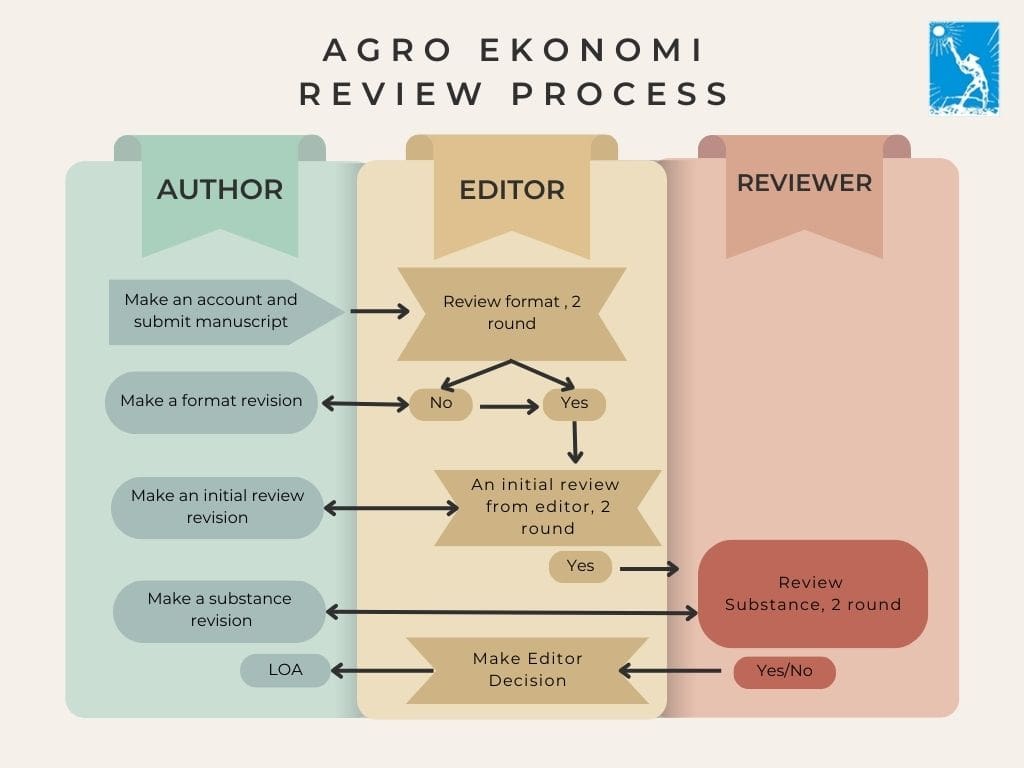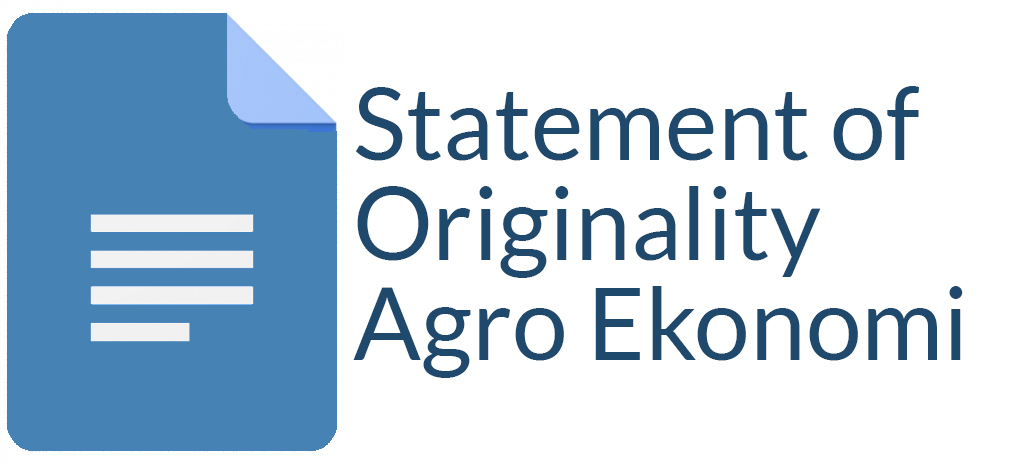Farmers’ Perception Of The Implementation Of Farmer Cards Policy In Klaten Regency
Aziz Mansya Patria(1*), Jangkung Handoyo Mulyo(2)
(1) Universitas Gadjah Mada
(2) Universitas Gadjah Mada
(*) Corresponding Author
Abstract
The Indonesian Farmer Cards is a government policy that aims to improve the distribution pattern of subsidized fertilizers. This study aims to determine the factors that influence farmers' perceptions of implementing the farmer card policy in the Klaten Regency. Klaten Regency was selected purposively as the research site because since the inception of Farmer Card policy, Klaten Regency has been designated as a pilot location for implementing the program. The data was collected by conducting surveys and interviews by using questionnaires. Moreover, ninety-two respondents were chosen by using a simple random sampling method. Data analysis employed the Likert scale to measure farmers' perceptions of the Farmer Card Policy. Farmers’ perceptions constituted two categories based on the weighting from the Likert scale. The first category refers to farmers that have a positive perception of the application of the Farmer Card and the second category represents farmers who have negative perceptions of the program implementation. The Likert scale in this study used to determine farmers' perceptions of the application of subsidized urea fertilizer distribution policies using farmer cards in Klaten Regency. Furthermore, logistic regression determined the factors influencing farmers' perceptions. The results showed that most farmers had positive perceptions. Four variables (experience, land area, time & convenience risk, and psychological risk) positively impact the farmers' perceptions of the Farmer Card. The other variables (urea allocation) negatively affect the farmers' perception of the Farmer Card Policy.
Keywords
Full Text:
PDFReferences
Arshad, A., Zafar, M., Fatima, I., & Khan, S. K. (2015). The Impact of Perceived Risk on Online Buying Behavior. International Journal of New Technology and Research (IJNTR), 1(8), 13–18. Chakim, M. L. (2020). Pengaruh Implementasi Kartu Tani terhadap Efektivitas Penyaluran Pupuk Bersubsidi di Kabupaten Kendal, Jawa Tengah. Jurnal Pangan, 28(3), 171–182. https://doi.org/10.33964/jp.v28i3.444 Darwis, V., & Supriyati, N. (2016). Subsidi Pupuk: Kebijakan, Pelaksanaan dan Optimalisasi Pemanfaatannya. Analisis Kebijakan Pertanian, 11(1), 45–60. https://doi.org/10.21082/akp.v11n1.2013.45-60 Khosla, S. S. (2018). Impact of Psychological Risk Factors on the Buying Decisions of The Consumers. International Journal of Management Studies, V(3(7)), 54. https://doi.org/10.18843/ijms/v5i3(7)/06 Kurniawati, E. K., & Kurniawan Andri. (2013). Persepsi Masyarakat terhadap Penggunaan Kartu Tani di Kabupaten Pati (Kasus di Desa Wotan dan Desa Pakem, Kecamatan Sukolilo). Jurnal Bumi Indonesia, vol. 7, no. 4, 2018.. Kuteya, A. N., Lukama, C., Chapoto, A., & Malata, V. (2015). Lessons Learnt from the Implementation of the E-voucher Pilot. Indaba Agricultural Policy Research Institute, 81, 1–4. Luangduangsitthideth, O., Limnirankul, B., & Kramol, P. (2019). Farmers’ Knowledge and Perceptions of Sustainable Soil Conservation Practices in Paklay District, Sayabouly province, Lao PDR. Kasetsart Journal of Social Sciences, 40(3), 650–656. https://doi.org/10.1016/j.kjss.2018.07.006 Moyo, M., Mvumi, B. M., Kunzekweguta, M., Mazvimavi, K., & Craufurd, P. (2012). Farmer Perceptions on Climate Change and Variability in Semi-arid Zimbabwe in Relation to Climatology Evidence. African Crop Science Journal - A Journal of Tropical Crop Science and Production, 20(2), 317–335. Nurulfahmi, D., Maria. (2020). Farmer’s Perception of the Implementation of the Farmer Card (Case Study in Kadirejo Village, Pabelan Subdistrict, Semarang Regency). Jurnal Agrisep. DOI: 10.31186/jagrisep.19.2.315-330. Sudjono, S. (2016). Sistem Distribusi Berbasis Relationship: Kajian Penyempurnaan Penyaluran Pupuk Bersubsidi kepada Petani. Analisis Kebijakan Pertanian, 9(4), 313–330. https://doi.org/10.21082/akp.v9n4.2011.313-330 Supriyanto, W., & Iswandari, R. (2017). Kecenderungan Sivitas Akademika dalam Memilih Sumber Referensi untuk Penyusunan Karya Tulis Ilmiah di Perguruan Tinggi. Berkala Ilmu Perpustakaan Dan Informasi, 13(1), 79–86. https://doi.org/10.22146/bip.26074 West, P. W. (2016). Simple Random Sampling of Individual Items in The Absence of A Sampling Frame that Lists the Individuals. New Zealand Journal of Forestry Science, 46(1), 1–7. https://doi.org/10.1186/s40490-016-0071-1 Widada, A. W., Masyhuri, M., & Mulyo, J. H. (2017). Determinant Factors of Food Security in Indonesia. Agro Ekonomi, 28(2), 205. https://doi.org/10.22146/jae.26245 Zhong, C., & Chen, Sanpan Xiao, Q. (2013). A case study of the Effectiveness of Agricultural Subsidies Policies : Theory and Evidence from Huangpi District, Hubei, China. Journal of Economics and Development Studies, 1(2), 1–18. http://jedsnet.com/journals/jeds/Vol_1_No_2_September_2013/1.pdf
Article Metrics
Refbacks
- There are currently no refbacks.
Copyright (c) 2018 Agro Ekonomi

This work is licensed under a Creative Commons Attribution-ShareAlike 4.0 International License.
View My Stats











